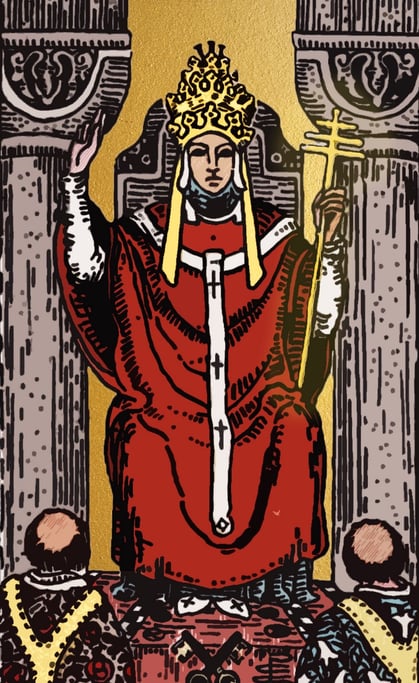Sympathy for the Hierophant
Reexamination of the Hierophant
It is sad that The Hierophant gets a bad rep; his image has been unjustly tainted. He has wrongly been associated with the evils of organized religion. As more people reject institutional religions and their dogmas for a personal path offering an unmediated relationship with divinity, The Hierophant became a villain. Sensing an aura of orthodoxy and institutionalization, many have had difficulty appreciating and understanding him.
One of the problems with this card is the confusion caused by the juxtaposition of a Catholic image, the Pope, with the title of the High Priest of the Eleusinian mysteries. The Pope is a trap because this card has nothing to do with Catholicism, Waite renamed this card for a reason. Hierophant (Gr. Ἱεροφάντης) is a compound of ta hiera, “the holy” and phainein, “to show.” Always keep that in mind first, this card represents a figure who reveals holy things to you. In the Greek tradition, Hierophant was the title of High Priest of the most sacred Eleusinian mysteries. The Hierophant was the initiator of the mystai (initiates) who received from the Hierophant esoteric teachings, direct experience with the Gods, and the removal of the fear of death. When you think about the Hierophant in this context, he is offering you a great gift but with one condition.
The condition is simple, you must listen to what the Hierophant has to say without objection so you can efficiently receive. This fundamental rule is hidden in plain sight. The two figures attending The Hierophant allude to your role as a good student. On the left, the figure has roses on his chasuble while the figure on the right has white lilies.
The Delphic High Priest and philosopher Plutarch instructed his students on the proper methods for listening to lectures. In his essay On Listening to Lectures, Plutarch points out displeasing behavior from students such as those:
“who make a sport and an opportunity to show off scholastic exercises, and applying meretricious commendation to sober discourse, as though they should put on an athlete’s head a crown of lilies or roses instead of laurel or wild olive!” Plutarch, Moralia. On Listening to Lectures.46. B
The Hierophant is not about accepting a dogma, creed or anything you may typically associate with religion. He is merely a teacher that is asking you to listen so you may learn. Don’t fight or argue with The Hierophant, whoever he or she may be in your life. When this card appears in a reading, think about how you can listen and learn. Ask yourself “am I resisting when I should actually be embracing so that may receive?”


